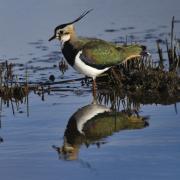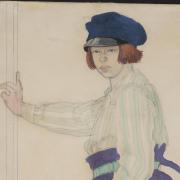Mabel Raymonde-Hawkins devoted her life to helping injured and unwanted animals and, more than 70 years on, Ringmer-based Raystede remains one of the UK’s most diverse rescue centres
Some visitors to Raystede get an unexpected greeting with the words ‘hello darling’. Any surprise from the cheeky salutation quickly gives way to delight when they realise they’re being addressed by Ollie the parrot who loves being the centre of attention.
When his previous owner became unwell, the East Sussex charity took the 25-year-old cockatoo under its own protective wing. He is among the assorted range of around 400 creatures housed at Raystede Centre for Animal Welfare in Ringmer at any one time.
Caring for all manner of animals from dogs, cats, rabbits, guinea pigs and horses to alpacas, goats, exotic birds, domestic fowl and, more recently, a large number of terrapins, the wide assortment makes Raystede one of the country’s most diverse sanctuaries. But there are still people who haven’t heard about it, or don’t realise Raystede’s reach extends throughout Sussex and beyond.

It was in 1934 that Miss Mabel Raymonde-Hawkins purchased the bungalow Homestead, later renamed Raystede, and just under two acres of land next to the B2192 Ringmer to Halland road. Volunteering with the RSPCA during the Second World War, in 1950 the former teacher, who went on to deputise for school heads throughout Sussex, decided to turn her home into an animal sanctuary. Two years later, Raystede became a registered charity.
‘Miss Raymonde-Hawkins was driven by an overriding compassion for animals of all shapes and sizes,’ says Stephanie. ‘She wanted to provide a sanctuary where neglected animals could be rehabilitated and rehomed, as well as promoting better welfare standards through education.

Raystede’s founder, who died in 1998 aged 95, used to take in an even wider variety of animals when the charity started.
‘This was due to the fact that there were few other charities or organisations around who could look after their needs,’ says Stephanie. ‘This has changed over the years sowe don’t take wild animals, for example, but often signpost any enquiries we receive to suitable charities such as East Sussex Wildlife Rescue & Ambulance Service and the RSPCA.’
Stephanie took over her role in 2020 and describes it as a privilege to work for the charity she has known since her Sussex childhood.

A typical day at the charity begins at 7am when the animal care teams go out and do a head count of all the animals and birds and give them breakfast. In total, the daily feed bills run to some £120.
‘The day continues with cleaning and providing enrichment such as toys and puzzle feeders to keep the animals busy and entertained,’ says Stephanie. ‘There may be some appointments during the day to meet and greet potential adopters. In these appointments they can meet one or more of our animals and get information about the one they wish to adopt. The teams also may have animals arriving with us or leaving for their forever homes. Sometimes the day involves vet appointments, to ensure the animals are healthy whilst they are staying with us.’

Over the years Raystede has been able to expand into surrounding fields and land. A new area is the terrapin sanctuary, the only one in the south - the other being in Lincolnshire - and the only one that is open to the public and offers an educational experience. Project Terrapin includes a lake and ‘beach’ area for around 300 terrapins
‘Terrapins are often bought as pets as they are small and relatively cheap,’ says Stephanie. ‘Many owners do not realise they grow into very large adults, the size of a dinner plate. Sadly, when they reach maturity, they are often dumped because they are difficult to rehome and many of them perish.’

‘Even during the lockdowns animals were being left at our gate, it didn’t stop,’ Stephanie says. Without the support of our fantastic donors and local communities we would not have survived.
‘We were asked to take in more than 4,000 animals last year. A lot of these animals are simply unwanted which is very sad. People often say that their children have lost interest or they don’t have time for the animal anymore. And the more recent cost of living challenge has really compounded the situation. The cost of animal food, pet insurance and, most of all, veterinary care has rocketed. We do what we can, one animal at a time, and provide the very best care for animals.’

‘One group that has been particularly overlooked is the plight of rabbits,’ says Stephanie. ‘Despite being one of the UK’s most popular pets, many sadly live lonely lives with owners unaware of their welfare needs. We regularly speak up for rabbits through our awareness and adoption events.’
Meanwhile, closer to home, Ollie the cockatoo continues to lend his voice to the charity started through one woman’s unwavering love of animals.

RAYSTEDE IN NUMBERS
Raystede helps more than 1,200 vulnerable animals each year.
The charity receives no government funding and has to raise £6,500 every day - or £271 an hour - to pay for all of its work with animals.
Raystede has more than 200 volunteers who fill a variety of roles from caring for the animals to welcoming visitors, providing pet advice in local communities, giving talks and helping at fundraising events and in the charity shops. Since April 2003 more than 20,000 hours have been gifted by volunteers.
In 1955 Miss Raymonde-Hawkins founded the Friends of Raystede support group with three supporters which grew to 40 within one month and 1,000 within the first year. By 1965 there were 6,000 members.
Peaceways, England’s first pet crematorium which is a short distance away from Raystede, was established in 1964 by Miss Raymonde-Hawkins.

HOW YOU CAN HELP
Residents in Sussex and beyond can apply to adopt and foster animals or become a volunteer. Some animals are available to sponsor, with twice-yearly updates and exclusive visits, and Raystede also organises fundraising and challenge events, offers corporate partnerships to businesses that want to support the charity and welcomes donations to its shops in Hailsham, Lewes, Uckfield and Ringmer (a ticket to Raystede is needed to visit the on-site shop). To find out more email info@raystede.org, call 01825 840252 or visit raystede.org
Raystede is open seven days a week, from 10am to 4pm and there are daily guided tours at 11.30am. Admission is free but it is essential to book tickets in advance through the website as visitor numbers are limited. Dogs on leads are welcome.



























